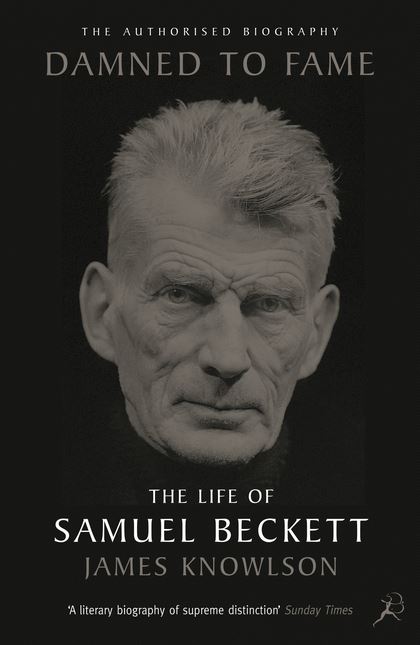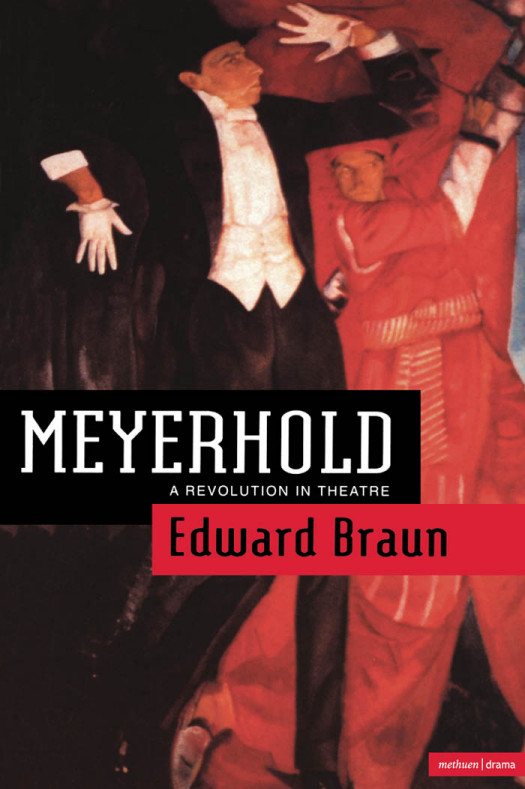James Knowlson: Damned to Fame: The Life of Samuel Beckett (1996)
Filed under book | Tags: · biography, literature, theatre

“Samuel Beckett’s long-standing friend, James Knowlson, recreates Beckett’s youth in Ireland, his studies at Trinity College, Dublin in the early 1920s and from there to the Continent, where he plunged into the multicultural literary society of late-1920s Paris. The biography throws new light on Beckett’s stormy relationship with his mother, the psychotherapy he received after the death of his father and his crucial relationship with James Joyce. There is also material on Beckett’s six-month visit to Germany as the Nazi’s tightened their grip.
The book includes unpublished material on Beckett’s personal life after he chose to live in France, including his own account of his work for a Resistance cell during the war, his escape from the Gestapo and his retreat into hiding.
Obsessively private, Beckett was wholly committed to the work which eventually brought his public fame, beginning with the controversial success of Waiting for Godot in 1953, and culminating in the award of the Nobel Prize for Literature in 1969.”
Publisher Bloomsbury, London, 1996
ISBN 0747527199
872 pages
via kmamdani
Reviews: Prendergast (London Review of Books, 1996), O’Hara (The New York Review of Books, 1996), Sipper (Los Angeles Times, 1996), Brown (European Review, 1997), Hutchings (World Literature Today, 1997).
Comment (0)Tony Harris: The Legacy of Cornelius Cardew (2013)
Filed under book | Tags: · avant-garde, biography, bourgeoisie, communism, composition, marxism, music, notation, politics

“Cornelius Cardew is an enigma. Depending on which sources one consults he is either an influential and iconic figure of British musical culture or a marginal curiosity, a footnote to a misguided musical phenomenon. He is both praised for his uncompromising commitment to world-changing politics, and mocked for being blindly caught up in a maelstrom of naïve political folly. His works are both widely lauded as landmark achievements of the British avant-garde and ridiculed as an archaic and irrelevant footnote to the established musical culture. Even the events of his death are shrouded in mystery and lack a sense of closure.
As long ago as 1967, Morton Feldman cited Cardew as an influential figure, central to the future of modern music-making. The extent to which Cardew has been a central figure and a force for new ideas in music forms the backbone to this book. Harris demonstrates that Cardew was an original thinker, a charismatic leader, an able facilitator, and a committed activist. He argues that Cardew exerted considerable influence on numerous individuals and groups, but also demonstrates how the composer’s significance has been variously underestimated, undermined and misrepresented.
Cardew’s diverse body of work and activity is here given coherence by its sharing in the values and principles that underpinned the composer’s world view. The apparently disparate and contradictory episodes of Cardew’s career are shown to be fused by a cohesive ‘Cardew aesthetic’ that permeates the man, his politics and his music.”
Publisher Ashgate, 2013
ISBN 140944810X, 9781409448105
228 pages
Reviews: Bruce Coates (Jems, 2013), Virginia Anderson (Music and Letters, 2013), Christopher Hobbs (NABMSA, 2013).
EPUB (updated on 2019-2-27)
Comment (0)Edward Braun: Meyerhold: A Revolution in Theatre (1979/1995)
Filed under book | Tags: · art, biography, biomechanics, constructivism, epic theatre, history of theatre, proletkult, revolution, symbolism, theatre

“Legendary Russian theater director Vsevolod Meyerhold (1874-1940) led the revolt against naturalism and flouted Stalinist socialist realism with his avant-garde productions incorporating mime, constructivist sets, musical scores and formalized scenery. His scenic invention and use of cinematic techniques culminated in his 1926 staging of Gogol’s The Government Inspector as well as reinterpretations of classics such as Pushkin’s Queen of Spades. Braun, a drama professor in England, sees Meyerhold as a supreme director-poet for whom the theater was designed to shatter the audience’s complacency. Decked out with 145 photographs of set reproductions, costumes and posters, Braun’s vibrant study restores Meyerhold’s radical legacy for contemporary theater. This revision of a work first published in 1979 draws on a wealth of newly discovered writings by Meyerhold, as well as KGB files released since 1989 that tell the full story of the director’s arrest, torture and execution after being falsely labeled a foreign agent by Stalin.” (Source)
Originally published in 1979
Second, revised and expanded, edition
Publisher Methuen Drama, 1995
ISBN 0413727300
347 pages
Reviews: Sharon Marie Carnicke (Modern Drama, 1996), Christine Kiebuzinska (Theatre Journal, 1996), Phil Shannon (Green Left Weekly, 1999).
PDF (33 MB)
Comment (0)
